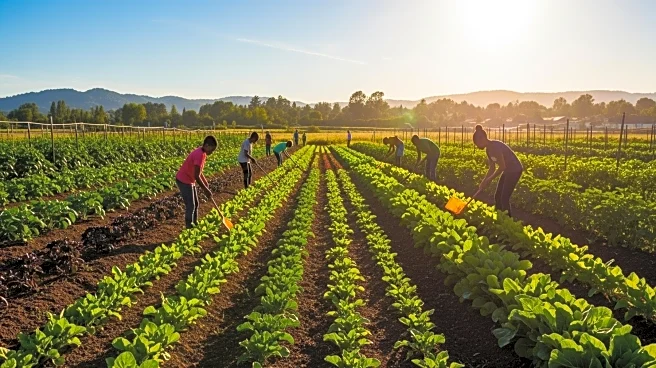What's Happening?
Mpho Montsho, a farmer in Luka, North West, is transforming her community by promoting agriculture as a viable alternative to mining jobs. Montsho runs Mphoentle Agribusiness, where she grows vegetables and manages livestock on a small plot. Her efforts are aimed at creating jobs and mentoring young people in agriculture. Despite challenges such as limited funding and infrastructure, Montsho is committed to expanding her operations with the recent allocation of five hectares of land by the Royal Bafokeng Traditional Council. Her goal is to develop a thriving agricultural enterprise that supports local families and provides economic relief.
Why It's Important?
Montsho's initiative is significant as it addresses unemployment and economic dependency on mining in Luka. By focusing on agriculture, she is providing sustainable job opportunities and empowering the youth. Her work challenges traditional gender roles in agriculture and promotes social impact through mentorship and community engagement. This approach not only diversifies the local economy but also fosters resilience and self-reliance among community members. Montsho's success could serve as a model for other communities facing similar economic challenges.
What's Next?
Montsho plans to expand her farming operations on the newly allocated land, aiming to increase production and employ more local youth. She envisions a diversified farm that supports both vegetable and livestock production, contributing to community sustainability. Her long-term goal is to train others to become commercial farmers, thereby creating a network of empowered individuals who can drive economic growth in Luka. Continued support from local authorities and access to resources will be crucial for realizing these ambitions.
Beyond the Headlines
Montsho's journey highlights the broader issue of economic diversification in mining-dependent regions. Her focus on agriculture as a transformative tool underscores the potential for community-led initiatives to drive change. The ethical dimension of her work involves challenging societal norms and advocating for gender equality in agriculture. Her story also raises questions about the role of traditional councils in supporting local entrepreneurs and the importance of infrastructure development in rural areas.









